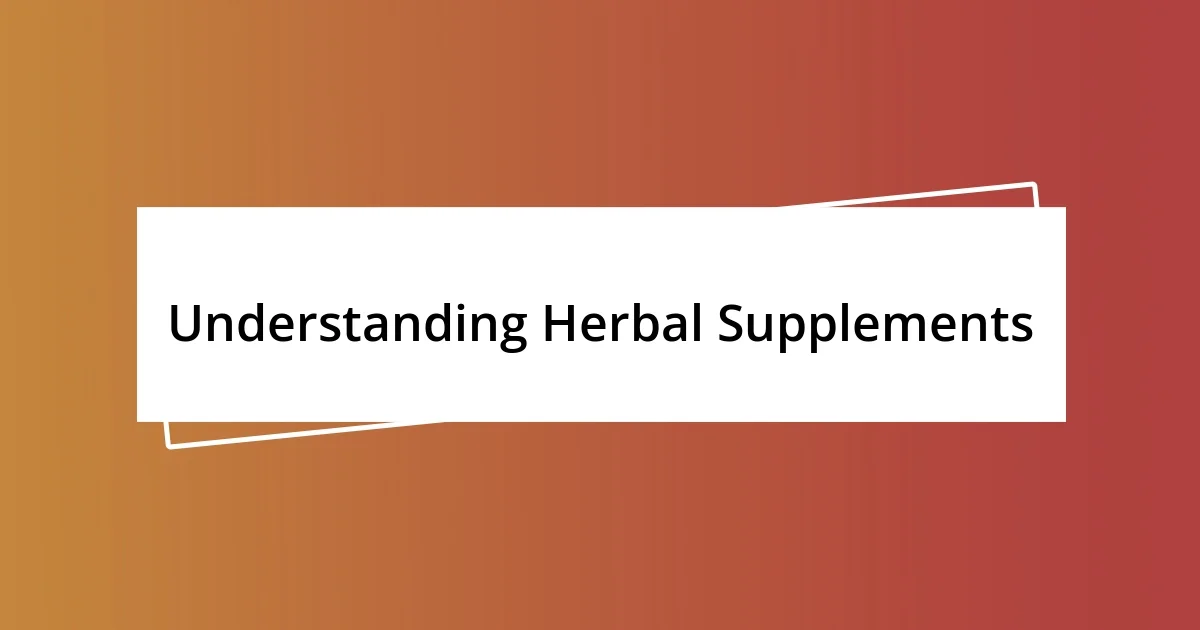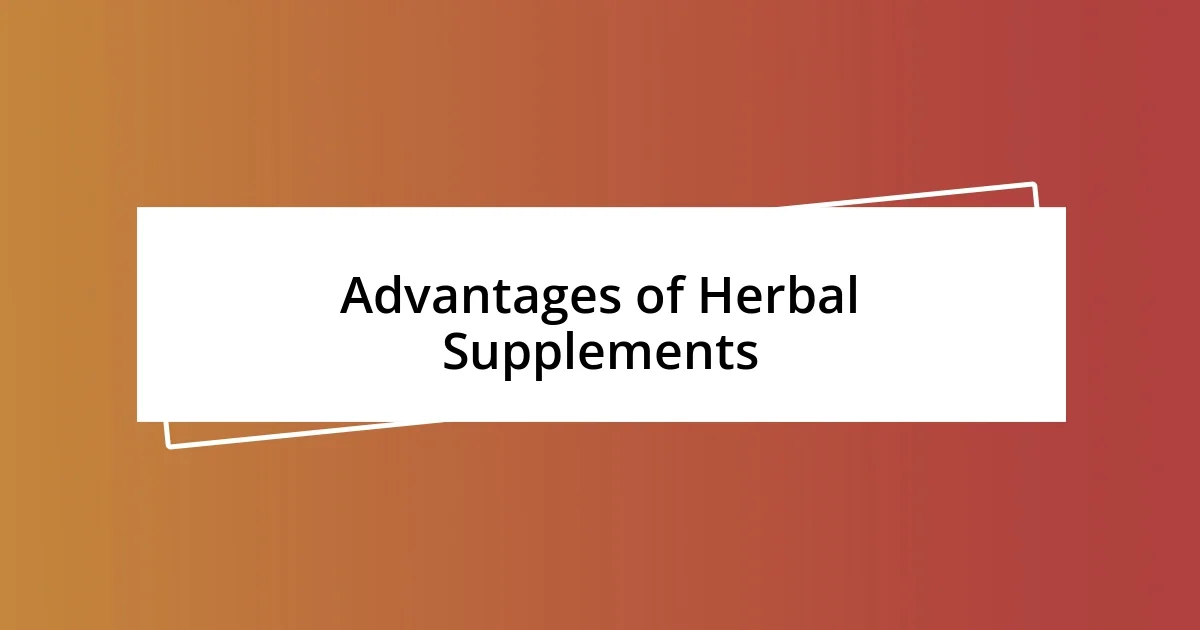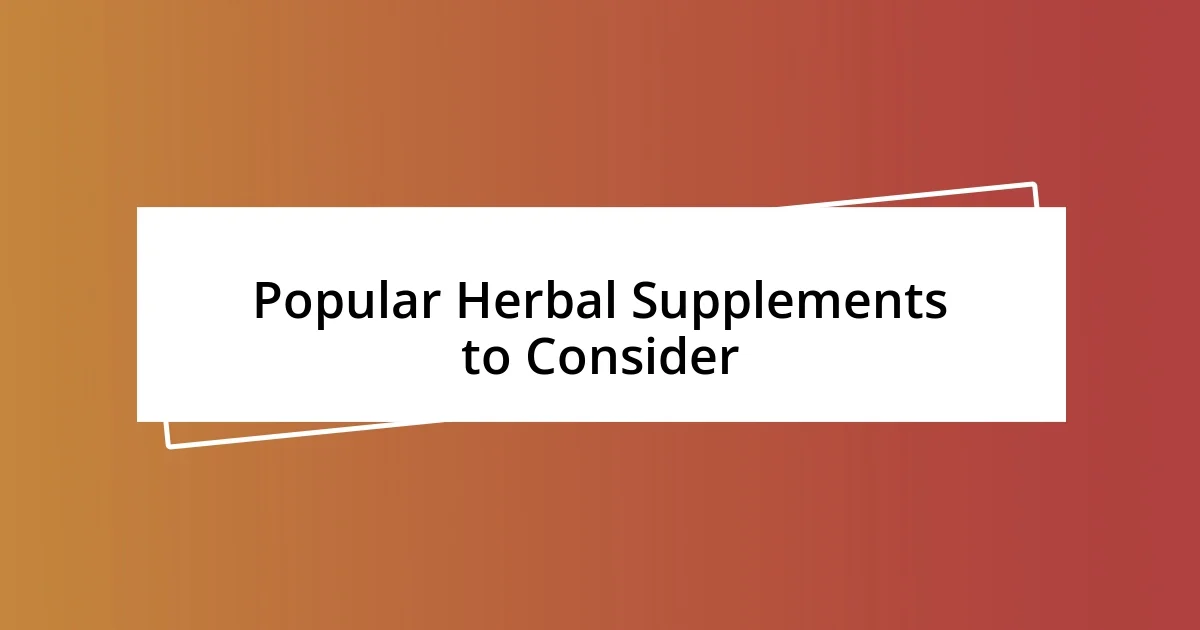Key takeaways:
- Herbal supplements can provide health benefits with fewer side effects than conventional medications, but thorough research and professional consultation are essential before use.
- Popular supplements like turmeric, ginseng, and elderberry offer various health advantages but may have potential risks, like side effects and interactions with medications.
- Integrating herbal supplements into daily life can be achieved through cooking, smoothies, and teas, while monitoring health via journaling and regular check-ins with healthcare providers is crucial.

Understanding Herbal Supplements
Herbal supplements are often seen as a more natural way to support health, but what does that really mean? My first encounter with herbal remedies was during a family gathering when an aunt passionately described the benefits of turmeric. I remember thinking, could something so simple actually hold the power to aid inflammation?
When diving into herbal supplements, it’s essential to understand that they can be incredibly potent. I once tried valerian root to combat occasional sleepless nights and found the difference remarkable. If you’ve ever struggled to fall asleep, imagine the relief of finally drifting off without tossing and turning.
However, it’s crucial to approach these supplements with awareness. Some herbs might interact with medications or even trigger allergic reactions. I often wonder if people rush into taking these remedies without fully understanding their potential impacts. That’s why I always emphasize doing thorough research and consulting healthcare professionals before incorporating new supplements into your routine.

Advantages of Herbal Supplements
The appeal of herbal supplements lies in their potential to offer various health benefits, often with fewer side effects than conventional medications. I remember when a friend of mine started using echinacea to support her immune system during cold seasons. She swore it helped her recover faster after getting sick, and I couldn’t help but admire her commitment to a more natural approach. It’s interesting how something derived from plants can sometimes feel more aligned with our bodies compared to synthetic alternatives.
Another advantage is the holistic approach many herbal remedies promote. For instance, when I experimented with ginger for digestive discomfort, I discovered not just relief from nausea but also a boost in my overall well-being. This experience helped me appreciate how certain herbs can interact with multiple bodily systems, making them a valuable addition to my health regimen.
Moreover, the accessibility of herbal supplements is noteworthy. They’re often available in various forms, such as teas, capsules, and tinctures, making it easy for individuals to find something that fits their lifestyle. I’ve even seen my grandmother infuse fresh herbs into her cooking, effortlessly weaving health into her meals. It’s a lovely reminder of how nature can support our wellness in everyday life.
| Advantage | Description |
|---|---|
| Natural Approach | Herbal supplements often have fewer side effects than synthetic medications. |
| Holistic Benefits | Some herbs address multiple health issues, promoting overall wellness. |
| Accessibility | Available in various forms, making them easy to integrate into daily routines. |

Popular Herbal Supplements to Consider
There are several popular herbal supplements that many people have found beneficial. For example, I recall a time I tried ashwagandha, which I was initially skeptical about. After using it for a few weeks, I really noticed a reduction in my stress levels. Feeling that pressure lift was such a relief, reinforcing my belief that some herbs truly can enhance our emotional well-being.
Here’s a quick look at some popular herbal supplements you might consider:
- Turmeric: Known for its anti-inflammatory properties, I’ve added it to my meals and can already feel a difference in my joints.
- Ginseng: I’ve heard friends rave about its energy-boosting effects, especially for those long workdays.
- St. John’s Wort: Many of my colleagues have turned to this for mood support; it’s fascinating how it may help with mild depression.
- Peppermint: I keep peppermint tea on hand for easing headaches and digestive discomfort—it’s refreshing and effective.
- Elderberry: Some family members swear by elderberry syrup during cold season, believing it helps fend off illnesses.
Each of these supplements has a unique charm and potential benefit, resonating with experiences and stories that continue to shape how we view natural health solutions.

How to Choose Quality Supplements
Choosing quality herbal supplements can feel overwhelming, but a few key considerations can simplify the process. Always check for third-party testing, which verifies that what’s in the bottle matches what’s on the label. I remember when I discovered that not all supplements are created equal; after choosing a brand that was NSF-certified, I felt much more confident about what I was putting into my body.
Another important factor is sourcing. It’s helpful to know where the herbs come from, as this can impact their potency and purity. For instance, I once experimented with a blend of herbal teas sourced from a local farm, and the difference in flavor and effect was noticeable compared to store-bought options. Isn’t it fascinating how the origin of a product can tell so much about its quality?
Lastly, don’t overlook customer reviews and testimonials. Reading about others’ experiences can provide insights you might not find elsewhere. I recall being swayed to try a particular herbal remedy after seeing a friend’s enthusiasm online. Her genuine results made me eager to give it a shot, and it turned out to be a great addition to my wellness journey. Engaging with the community can really enhance your understanding of what works best for you!

Potential Risks and Side Effects
While herbal supplements can offer various benefits, it’s crucial to understand that they may come with potential risks and side effects. For example, I remember when I took St. John’s Wort; it certainly enhanced my mood but also made my skin more sensitive to sunlight. If I hadn’t been careful, I could have faced severe sunburns. Isn’t it wild how something natural can have such unexpected consequences?
Another concern is the lack of regulation in the supplement industry. Unlike prescription medications, herbal supplements aren’t always thoroughly tested for safety and efficacy. I once tried a lesser-known herbal blend for digestive issues, only to experience unwanted gastrointestinal discomfort. It served as a reminder that even seemingly harmless herbs can affect individuals differently. Have you ever had a similar experience with a natural remedy?
Moreover, it’s worth considering interactions between herbal supplements and conventional medications. I know a friend who started taking ginseng to boost her energy while on blood thinners. Unfortunately, she later learned that it could reduce the effectiveness of her medication, leading to a serious health scare. It’s vital to consult a healthcare professional before integrating these supplements into your routine. What’s your take on discussing herbal supplement use with your doctor? I think it’s a step that shouldn’t be overlooked.

Ways to Integrate Supplements into Diet
Integrating herbal supplements into your daily diet can be a seamless process if approached thoughtfully. One method I found effective is adding powdered supplements to my morning smoothie. Not only does it blend well with fruits and yogurt, but it also masks any overpowering flavors that some herbs might have. Have you ever tried this? It can be a game-changer.
Another interesting way to incorporate supplements is through cooking. I often sprinkle turmeric into my soups and curries. This not only boosts the flavor but also taps into its known anti-inflammatory properties. I remember the first time I did this; the rich golden color and earthy taste transformed my dish, making it feel nourishing in more ways than one. It’s incredible how simple cooking techniques can enhance health.
Don’t forget about herbal teas! I frequently swap out my afternoon coffee for a calming chamomile or peppermint tea infused with adaptogenic herbs. This has created a lovely ritual that promotes relaxation while giving my body a gentle boost. Have you considered how switching your beverage choices could influence your overall wellness? I find that even small changes can lead to significant benefits in how I feel throughout the day.

Tips for Monitoring Your Health
Keeping track of your health isn’t just about monitoring symptoms—it’s also about understanding your body in a holistic way. I often jot down notes in a health journal, capturing how I feel each day, including any changes when I introduce a new herbal supplement. It’s fascinating to see patterns emerge over time. Have you ever considered how daily journaling could unveil insights about your well-being?
Regular check-ins with your healthcare provider can also be a game-changer. For instance, I make it a point to have routine blood work done, especially when trying new herbs. I vividly remember a time when I learned from my doctor that my vitamin levels were off, which led me to adjust my supplement choices. It’s eye-opening how what feels right may not always align with our nutritional needs. What do you think? Isn’t it reassuring to have that professional guidance to steer your health journey?
Lastly, I recommend listening to your body. Sometimes I find myself feeling sluggish after certain supplements. Instead of dismissing it, I reflect on possible causes. It’s a reminder to pay attention, whether that means adjusting dosages or taking breaks from certain herbs. How do you tune into your body’s signals? I believe this self-awareness is crucial for maintaining a balanced approach to health.














